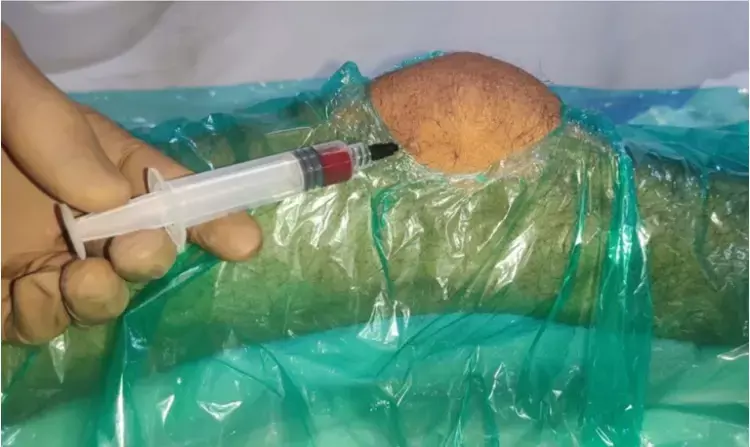- Home
- Medical news & Guidelines
- Anesthesiology
- Cardiology and CTVS
- Critical Care
- Dentistry
- Dermatology
- Diabetes and Endocrinology
- ENT
- Gastroenterology
- Medicine
- Nephrology
- Neurology
- Obstretics-Gynaecology
- Oncology
- Ophthalmology
- Orthopaedics
- Pediatrics-Neonatology
- Psychiatry
- Pulmonology
- Radiology
- Surgery
- Urology
- Laboratory Medicine
- Diet
- Nursing
- Paramedical
- Physiotherapy
- Health news
- Fact Check
- Bone Health Fact Check
- Brain Health Fact Check
- Cancer Related Fact Check
- Child Care Fact Check
- Dental and oral health fact check
- Diabetes and metabolic health fact check
- Diet and Nutrition Fact Check
- Eye and ENT Care Fact Check
- Fitness fact check
- Gut health fact check
- Heart health fact check
- Kidney health fact check
- Medical education fact check
- Men's health fact check
- Respiratory fact check
- Skin and hair care fact check
- Vaccine and Immunization fact check
- Women's health fact check
- AYUSH
- State News
- Andaman and Nicobar Islands
- Andhra Pradesh
- Arunachal Pradesh
- Assam
- Bihar
- Chandigarh
- Chattisgarh
- Dadra and Nagar Haveli
- Daman and Diu
- Delhi
- Goa
- Gujarat
- Haryana
- Himachal Pradesh
- Jammu & Kashmir
- Jharkhand
- Karnataka
- Kerala
- Ladakh
- Lakshadweep
- Madhya Pradesh
- Maharashtra
- Manipur
- Meghalaya
- Mizoram
- Nagaland
- Odisha
- Puducherry
- Punjab
- Rajasthan
- Sikkim
- Tamil Nadu
- Telangana
- Tripura
- Uttar Pradesh
- Uttrakhand
- West Bengal
- Medical Education
- Industry
Therapeutic joint aspiration relieves pain significantly in acute haemarthrosis of knee Joint

Bleeding into the joints cause major morbidity in haemophilia patients. The clinical hallmark of haemophilia is haemarthrosis especially in knee, ankle and elbow joint. Current literature suggests that aspiration of an acute haemarthrosis in haemophilia may lead to further bleeding and prevent tamponade effect. But the rehabilitation gets delayed, leading to joint stiffness and the function gets deteriorated.
Abhishek Kumar Rai et al conducted a study to evaluate the efficacy of joint aspiration in the management of acute knee haemarthrosis, with regard to pain relief and functional outcome.
A prospective, randomised controlled trial was done in a tertiary care haemophilia treatment centre (Department of Orthopaedics, Seth GS Medical College and KEM Hospital, Mumbai, India) comprising 120 haemophilic patients with unilateral acute knee haemarthrosis. Factor level was checked and appropriate factor replacement [40%] was done. The patients were randomly allocated in two groups: Group A and Group B, each consisting of 60 patients. All patients received ice application, limb immobilisation, analgesics, physiotherapy and compression bandage as the routine primary management. In addition, study Group A also received therapeutic aspiration of the knee joint at initial presentation, after the first factor infusion.
Under all aseptic precaution, the joint was disinfected with a chlorhexidine-based antiseptic and covered with a sterile drape. A 18 gauge standard intramuscular needle (0.8 × 40 mm) was used with 10 or 20 mL syringes. A lateral suprapatellar approach was selected. The patient was placed in the supine position, with the knee held in extension to relax the extensor mechanism. The needle was inserted 2 cm proximally and 2 cm laterally to the superolateral angle of patella and advanced to the bottom of the suprapatellar pouch, pointing towards the medial malleolus of the opposite limb. The quantity of aspirate varied in all patients as per the age and severity. The aspirated fluid was discarded. In those cases, where it was difficult to aspirate through superolateral approach, other approaches were tried. In cases of fixed flexion deformity of knee, inferomedial and inferolateral approaches were preferred.
All patients were clinically evaluated for pain in terms of Visual Analogue Scale (VAS score) and function in terms of Haemophilic Joint Health Score [HJHS], before and at 4 h, 48 h and 7 days after initial factor administration.
Key findings of the study:
• All patients showed therapeutic improvement in terms of a declining trend in VAS and HJHS scores.
• Pain relief (VAS Score) in Group A, was found to be significantly better compared to Group B at the end of 4 h [4.80±0.49 vs 6.54±1.05; p<0.001],48 h [2.48±0.50 vs 3.30±0.46; p<0.001], and 7 days [2.36±0.48 vs 5.52±0.67; p<0.001].
The authors said - "Our study recommends the use of joint aspiration as a therapeutic tool in the holistic management of acute knee haemarthrosis in addition to usual treatment of ice application, immobilization and physiotherapy in addition to requisite factor correction. Early factor replacement along with therapeutic joint aspiration is a key for better pain relief and a better functional outcome."
Further reading:
Outcome of Joint Aspiration in Acute Knee Haemarthrosis in a Haemophilic Joint: A Prospective Randomised Controlled Trial in 120 Patients in a Tertiary Haemophilia Care Centre
Abhishek Kumar Rai, Shubhranshu Shekhar Mohanty et al
Indian Journal of Orthopaedics
https://doi.org/10.1007/s43465-022-00745-x
MBBS, Dip. Ortho, DNB ortho, MNAMS
Dr Supreeth D R (MBBS, Dip. Ortho, DNB ortho, MNAMS) is a practicing orthopedician with interest in medical research and publishing articles. He completed MBBS from mysore medical college, dip ortho from Trivandrum medical college and sec. DNB from Manipal Hospital, Bengaluru. He has expirence of 7years in the field of orthopedics. He has presented scientific papers & posters in various state, national and international conferences. His interest in writing articles lead the way to join medical dialogues. He can be contacted at editorial@medicaldialogues.in.
Dr Kamal Kant Kohli-MBBS, DTCD- a chest specialist with more than 30 years of practice and a flair for writing clinical articles, Dr Kamal Kant Kohli joined Medical Dialogues as a Chief Editor of Medical News. Besides writing articles, as an editor, he proofreads and verifies all the medical content published on Medical Dialogues including those coming from journals, studies,medical conferences,guidelines etc. Email: drkohli@medicaldialogues.in. Contact no. 011-43720751


